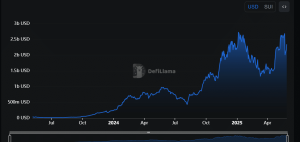- Tether has ceased issuing EURT, its Euro-backed stablecoin, citing compliance with the EU’s MiCA regulation.
- EURT holders have until November 27, 2025, to redeem their assets, as Tether shifts focus to MiCA-compliant initiatives like EURQ and USDQ.
In a significant move for the blockchain and cryptocurrency sector, Tether, the company behind the world’s largest stablecoin USDT, has officially ceased issuing EURT, its Euro-backed stablecoin.
The decision follows the enforcement of the European Union’s Markets in Crypto-Assets (MiCA) regulation, a legislative framework that governs stablecoins and other crypto-assets within the EU.

Tether announced on November 27 that it had carefully evaluated the regulatory environment before making this strategic decision. According to the company, the issuance of EURT had already been paused in 2022, and no new applications for EURT issuance will be accepted.
Users currently holding EURT across all supported networks will have until November 27, 2025, to redeem their funds.

The introduction of MiCA earlier this year has reshaped the landscape for stablecoins in Europe, driving this operational pivot. MiCA imposes stringent compliance requirements for stablecoin issuers, including robust safeguards for consumer protection and market stability.
While Tether did not explicitly attribute its decision to MiCA, the company acknowledged the growing regulatory complexity in the European market, aligning its strategy accordingly.
Tether emphasized its commitment to prioritizing initiatives that align with the evolving regulatory framework, stating its intent to support innovation while maintaining risk mitigation for its users.
The company expressed that the cessation of EURT issuance is part of its broader strategic shift to focus on products better suited to the regulatory landscape in the EU.
The impact of MiCA on the stablecoin market has been notable. Reports indicate a significant decline—approximately 70%—in Euro-stablecoin business volume since the regulation came into effect.
Analysts from blockchain research firm Kaiko noted that demand for Euro-backed stablecoins has not surged despite the regulatory changes, highlighting challenges in scaling such assets under MiCA’s framework.
Tether is now redirecting its efforts toward developing new stablecoins that comply with MiCA regulations. The company has invested in Quantoz Payments, a European blockchain services provider, to launch EURQ and USDQ. These stablecoins aim to adhere to MiCA’s requirements while offering an innovative, compliant solution for users and businesses operating within the EU.
This strategic shift underscores the challenges faced by stablecoin issuers in navigating regulatory environments while continuing to innovate and deliver secure, user-focused products.
The post Tether Halts EURT Issuance Amid Regulatory Changes in the EU appeared first on ETHNews.

